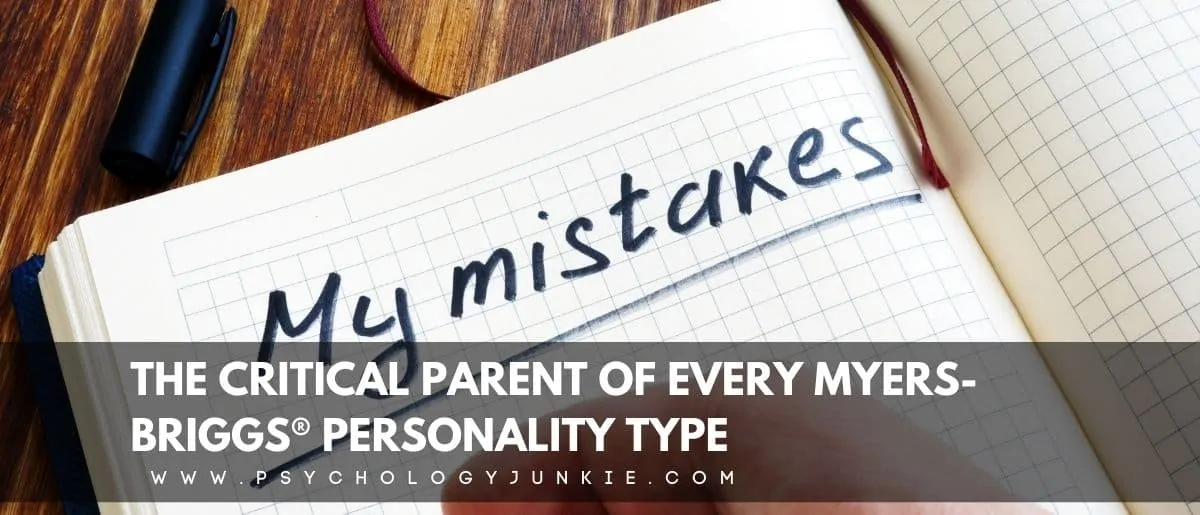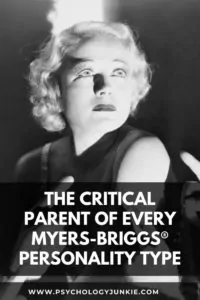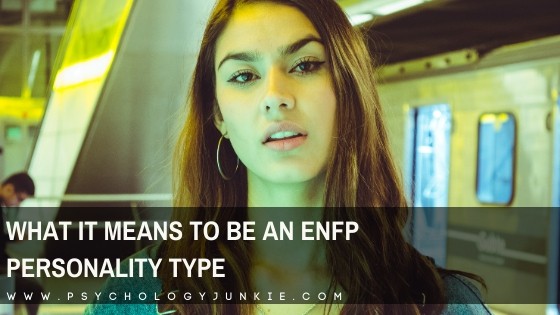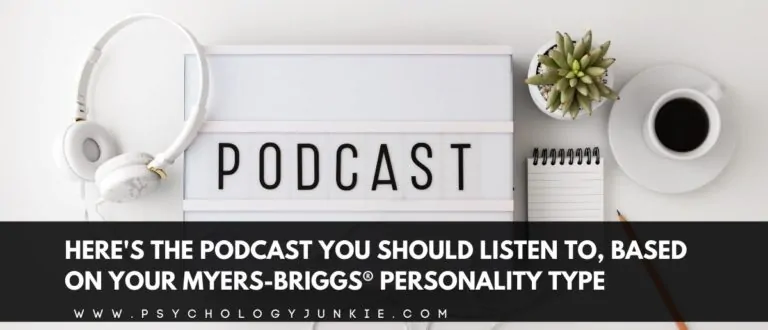The Critical Parent of Every Myers-Briggs® Personality Type
Today we’re continuing our deep-dive series into each of the 16 Myers-Briggs® personality types. If you’re a newbie to type, this may be a little intense for you. If you’re looking for something that can explain the basics of Myers-Briggs typology, you can get a beginner’s look in our article, A Brief Guide to the MBTI® for Busy People.
If you’d like to dive into the deep end of personality type, then this is the article series for you.

This article contains affiliate links. If you purchase a book that I’ve recommended or used as a source here then I get a small commission that I can use to keep Psychology Junkie running. I only recommend books I truly love.
Your Cognitive Function Stack
Each of us is mentally wired to understand and perceive the world in a completely unique way. When you really understand your type, you can understand why you notice things other people don’t, and they notice things you don’t! You can understand why you might disagree about certain major decisions with other personality types.
Each personality type has a unique cognitive function stack. This stack tells us which mental processes you prioritize and value, as well as which mental processes you struggle to prioritize or value.
As an example, here’s the cognitive function stack of the ENTJ personality type:
ENTJ Primary Function Stack (these are your four valued mental processes, in order from strongest to weakest):
Dominant Function/Hero: Extraverted Thinking (Te)
Auxiliary Function/Good Parent: Introverted Intuition (Ni)
Tertiary Function/Eternal Child: Extraverted Sensation (Se)
Inferior Function/Anima/Animus: Introverted Feeling (Fi)
ENTJ Shadow Function Stack (these are your four unvalued mental processes, in order from strongest to weakest):
Opposing Role: Introverted Thinking (Ti)
Critical Parent/Witch: Extraverted Intuition (Ne)
Trickster: Introverted Sensation (Si)
Demon: Extraverted Feeling (Fe)
Over the last few weeks we’ve explored the dominant, auxiliary, tertiary, inferior, and opposing role functions. You can read more about those in the following links:
The Dominant Function of Every Myers-Briggs Personality Type
The Auxiliary Function of Every Myers-Briggs® Personality Type
The Tertiary Function of Every Myers-Briggs® Personality Type
The Inferior Function of Every Myers-Briggs® Personality Type
The Opposing Role of Every Myers-Briggs® Personality Type
The Critical Parent (Witch/Senex) Role
The Critical Parent function has both positive and negative tendencies. While your auxiliary function has a supportive, nurturing energy, the Critical Parent can be limit-setting, belittling, and humiliating. While the auxiliary function guides people gently, the Critical Parent is harsher and more condescending. Some typologists call this the “Witch/Senex” function, but keep in mind that this function role has nothing to do with witchcraft. The title is meant merely to give an idea of the energy of this function.
“The Witch/Senex lacks the governing mechanism of consciousness to ensure that it’s only used appropriately. Its criticisms are often withering and crippling.”
– Mark Hunziker, Depth Typology
Unlike the functions in your primary function stack, the Critical Parent often operates insidiously. Sometimes we don’t even realize we’re tapping into this function when we are. Other people are likely to see it, but we may be blind to it. That’s because our ego hasn’t accepted this function as part of us. We see it as something “other.” We’re more likely to project the critical function onto others than to recognize it in our own lives.
It’s important to realize that the Critical Parent isn’t always negative. It helps to balance out your ego and keep your auxiliary function from getting inflated. As we grow and mature, this function can keep us humble and help us to grow – especially if we realize what it is and how it works.
The Critical Parent of Every Myers-Briggs® Personality Type
The ENFP and ESFP Personality Types – Critical Parent Extraverted Feeling (Fe)
What Fe Is:
Extraverted Feeling (Fe) focuses on creating a sense of harmony and camaraderie with others in the environment. Extraverted Feeling types (FJs) try to get everyone on the same page so that they can move in a unified direction. They will often put their own individualized concerns on the backburner to focus on the overall needs of the group. They enjoy an open, transparent sharing of feelings so that everyone feels connected and has a sense of solidarity.
What ENFPs Prefer:
As an EFP, you value Introverted Feeling (Fi) over Extraverted Feeling (Fe). You crave a sense of harmony with others, but not at the expense of your individual values. Introverted Feeling focuses on living in harmony with one’s own values and desires, which means that you prefer to stick to your individual code of ethics and path in life. If you rock the boat by being individualistic, then so be it. You also try to hold space for others to be their unique selves.
The Good Side of Critical Parent Fe:
Critical Parent Extraverted Feeling can help you to have a stronger sense of the needs and values of the people around you. It can help to broaden your views, take in other people’s needs, and assess group and societal values to determine whether they are valuable for yourself or others. You become more expressive of your feelings and feel a stronger sense of unity and mutual support with others.
The Potential Negative Sides of Critical Parent Fe:
When you feel vulnerable, attacked, cranky, or ashamed your Critical Parent might show up in belittling or harsh remarks towards yourself or others. You might chastise yourself or others for failures at Extraverted Feeling (responding to group needs, respecting societal values, demonstrating feeling values outwardly). You might have intrusive thoughts like: “You never think of anyone but yourself,” “You had to make everything awkward, didn’t you?” “You’re such a weirdo,” “You’ll never fit in.”
You also might find yourself getting annoyed by expressions of Extraverted Feeling, saying or thinking things like:
“Why do you have to be so worried about what everyone else wants? Don’t you have any of your own values.”
“Why are you such a people pleaser? It’s like you don’t even know yourself.”
“Stop trying to make me conform to your group values!”
“You can’t control me or tell me how to feel!”
Retaliating with Critical Parent Fe:
You might also exude Critical Parent Fe when you’re feeling vulnerable or stressed. At these times you might imply that others should get in line with group values or focus on others instead of themselves. Even though you don’t like feeling pressured to conform to group values, you might find yourself convincing others to do so for the betterment of the group.
Critical Parent Fe and Projections:
Critical Parent Fe can show up in your interactions with Feeling-Judging personality types (xxFJs, especially ExFJs). You might feel like people who value Extraverted Feeling are being critical or condescending when they are not. Their natural tendency to try to get people on the same page can seem off-putting to your Introverted Feeling desire for autonomy and personal freedom. Their tendency to encourage an open sharing of feelings and emotions might seem disingenuous, pushy, or phony to you.
The ENTP and ESTP Personality Types – Critical Parent Extraverted Thinking (Te)
What Te Is:
Extraverted Thinking organizes the environment for efficiency and clarity. It focuses on empirical facts to move forward and is conscious of time, deadlines, and inefficiencies. Extraverted Thinking types (TJs) like to move at a steady, rapid pace towards their goals, so they rely on rules or general guidelines to keep their pace as methodical and quick as possible.
What ExTPs Prefer:
As an ETP personality type, you crave a thorough understanding of how objects or concepts work. You like to amass facts about how the world works and organize those facts in your mind so that you can make sense of the world around you. You value an organized mind more than an organized environment. Therefore, you keep your mind neatly arranged with information that is carefully sorted into categories and sub-categories. You enjoy learning the various components that make something up, which probably led you to take things apart as a child to understand how things were put together. Even now, when you get a new iPhone or computer, you probably enjoy learning every little detail about how it works. You may even feel tempted to take the whole thing apart just to understand how it all fits together. Understanding how things work in a deep, comprehensive sense is vital to you.
The Good Side of Critical Parent Te:
Critical Parent Extraverted Thinking can help you not to get drowned out by your Introverted Thinking side. It can help you to be more decisive, efficient, and focused. Te can help you to take the principles and theories roaming around in your mind and put them into action, creating sequential guidelines that others can easily follow.
The Potential Negative Side Effects of Critical Parent Te:
Your Critical Parent Extraverted Thinking side can show up when you are feeling ashamed, vulnerable, cranky, or defensive. When the world around you lacks structure and clear direction, or when you have failed to organize your life in a logical way, you might berate yourself or others, thinking or saying things like:
“Stop mulling over this and just GET SOMETHING DONE!”
“Hurry up and make a decision! You’re so slow”
“Why can’t anyone keep this room organized?”
“Why is everyone so inefficient?”
“Why can’t you ever finish what you start? You’ll never get anything done.”
“Idiot! This trouble would all have been avoided if you’d just followed the system or the rules”
You might also find yourself getting annoyed by expressions of Extraverted Thinking, saying or thinking things like:
“Why are you so bossy and controlling?”
“Why can’t you just let me do things my own way?”
“These rules that you’re spouting off go against my principles and my freedom.”
“I know more about what’s logical than you do! Stop trying to tell me how to organize my life”
Retaliating with Critical Parent Te:
You might exude Critical Parent Te when others are disrupting the flow of your life, creating disorder, or failing to see what you perceive as obvious logical principles. When other people are slowing down your goals or plans or are failing to accept empirical truths that you have absorbed into your mental map then you can become harshly critical of them. You might reprimand their lack of efficiency, their inability to follow simple rules, or their slowness in coming to a decision. Your mind won’t want to dwell on this tendency because your ego tends to reject the shadow as your true “self.” As a result, you may be blind to your weaknesses in this area.
Critical Parent Te and Projections:
Critical Parent Te can show up in your interactions with Thinking-Judging personality types (xxTJs). You might feel like people who value Extraverted Thinking are being domineering, belittling, or harsh when they are not. This is due to projecting your own Critical Parent Te onto them. You might become rebellious or dismissive of their instructions or their tendency to organize everything (and everyone) around them. You might feel like they are dismantling your own need for understanding and truth with their need for efficiency and order.
The INFJ and ISFJ Personality Types – Critical Parent Introverted Feeling (Fi)
What Fi Is:
Introverted feeling focuses on alignment with one’s inner values and feelings. It asseses one’s own emotional state and tries to discern what those states mean. Living in harmony with one’s ethical code , desires, and emotional needs is of the highest priority to the Introverted Feeling type (IFP).
What IxFJs Prefer:
As an IFJ personality type, you value Extraverted Feeling (Fe) over Introverted Feeling (Fi). You are deeply aware of the emotional atmosphere you are in. You naturally sense how people are feeling and notice minor shifts in their emotional state. You may put your own individual needs or desires on the backburner to take care of group needs or avoid “rocking the boat.” You easily notice social expectations and cultural values and try to respect those unless they are violating a deeply-held value. You may be somewhat blind to your own emotional needs or internal states as you try to tend and nurture other people’s emotions.
The Good Side of Critical Parent Introverted Feeling:
Introverted Feeling can help you to slow down, quiet your mind, and center yourself on your own values and feelings. Rather than being pushed and pulled by other people’s emotional needs, it can help you to stop and say “No,” assess what your emotions are telling you, and what really matters to you on an individual level.
The Potential Negative Sides of Critical Parent Fi:
Your Critical Parent Introverted Feeling side can show up when you are feeling ashamed, vulnerable, extremely irritable, or defensive. When you have failed to stand up for yourself, when you have betrayed one of your own values, or when you see others acting in a way that you see as unethical, it can show up in internal or external criticisms like:
“What kind of person are you? How could you do something so wrong?”
“You are being so phony. Why can’t you just be yourself?”
“Why do these groups lack a conscience? What is wrong with them?”
“You’ll never be good enough”
“You’re worse than other people”
“Because of (past moral failing) you’ll never amount to anything.”
Because your ego doesn’t naturally accept the shadow side of your personality, you may be blind to your Critical Parent tendencies. It may take time and reflection before you realize that this Critical Parent side has any place in your life. As an INFJ your Critical Parent is Introverted in direction, therefore the criticisms are often internalized or directed at yourself. You might be much more critical and harsh on the inside than anyone ever sees on the outside. You may struggle to forgive yourself for ethical shortcomings and may replay your moral failures over and over again in a way that makes you feel limited and unable to move forward.
You might also find yourself getting annoyed by expressions of Introverted Feeling, saying or thinking things like:
“Why are you putting your own feelings above the feelings of everyone else?”
“Why can’t you just get on board with what everyone needs?”
“Why are you so selfish?”
“Why can’t you just share your feelings with me? You’re hiding something from me!”
Retaliating with Critical Parent Fi:
You might also exude Introverted Feeling when you’re dealing with people who you see as inauthentic or lacking in personal conviction. You might be critical of them for not having a clear set of individual values, or you might feel harshly critical and dismissive of people who disagree with your own personal values.
Critical Parent Fi and Projections:
Critical Parent Fi can show up in your interactions with Feeling-Perceiving personality types (xxFPs). Because you experience Introverted Feeling in a critical or harsh way, you might feel like FPs are being critical, dismissive, or harsh even when they don’t intend to be. We tend to project our shadow functions onto others without realizing we’re doing it. You might feel irritable or annoyed when people are prioritizing their individual needs over those of the group or privately analyzing their own values and needs instead of sharing them and getting feedback.
Read These Next:
24 Signs That You’re an INFJ Personality Type
24 Signs That You’re an ISFJ Personality Type
The INTJ and ISTJ Personality Types – Critical Parent Introverted Thinking (Ti)
What Ti Is:
Introverted Thinking categorizes and sorts information into fine-tuned mental maps. It evaluates and analyzes data deeply, looking for key principles, underlying frameworks, and inconsistencies. Introverted Thinking personality types (TPs) value clarity and precision with words and are more focused on getting a precise, comprehensive, accurate answer than an efficient answer.
What IxTJs Prefer:
As an ITJ personality type, you value Extraverted Thinking over Introverted Thinking. Your Extraverted Thinking side serves either Introverted Intuition (for the INTJ) or Introverted Sensation (for the ISTJ). You don’t want to waste time mulling over frameworks and “minutiae” when you’ve got a vision or plan to achieve. You like to move towards your goals at a steady, organized pace. A real-world model is more important to you than a mental model.
The Good Side of Critical Parent Ti:
Critical Parent Introverted Thinking can help INTJs to deepen their understanding of the logical principles at play in a situation. When they respect this process, they can think and act in more consistent ways, become more investigative, and articulate the operating principles at play in a situation much more easily. They will take less shortcuts to complete their plans, slowing down and checking for more thorough logical consistency.
The Potential Negative Sides of Critical Parent Ti:
Negative Critical Parent Ti side can show up when you’re feeling ashamed, vulnerable, defensive, or extremely irritable. If someone negates your plan or vision, you might criticize their logical framework and try to dismiss their lack of nuanced comprehension. You can turn this criticism inward, towards yourself, as well. You might, internally or externally, berate, dismiss, or criticize, saying things like:
“Don’t you see how this framework is constructed? How could you miss something so obvious!”
“How could you miss this technical principle? What’s wrong with you?”
“If you’d only looked at the logical construction of this plan, you’d have seen all these errors. But you were in too much of a hurry. You should just give up.”
“You should have analyzed the logic of this better. How could you be so blind?”
You might also find yourself getting annoyed by expressions of Introverted Thinking, saying or thinking things like:
“Stop throwing random principles at me, and give the plan!”
“Why are you limiting me by getting stuck on models and frameworks I don’t care about?”
“Mulling things over down to the fine-details like this will get us nowhere.”
It may take a lot of time and reflection before you can recognize the Critical Parent side of your personality type. Because we don’t see our shadow functions as part of ourselves, we tend to be blind to our shortcomings and tendencies when in their control.
Critical Parent Ti and Projections:
Critical Parent Ti can also show up in your communications with Thinking-Perceiving personality types (xTPs). Because you experience Introverted Thinking in a critical or belittling way, you might feel like TP types are being critical or demeaning even if they don’t mean to be. You might project Critical Parent energy onto people who are focused more on frameworks and principles than use and implementation.
The ESFJ and ESTJ Personality Types – Critical Parent Extraverted Sensation (Se)
What Se Is:
Extraverted Sensation is skilled at noticing everything that’s happening in the present moment. It is attuned to opportunities, experiences, and spur-of-the-moment enjoyments. It can accurately assess what’s happening without getting lost in reflections. Se-dominant personality types (ESPs) have a knack for staying in the present, noticing details, responding to surprise information or tasks, and maneuvering the physical world around them.
What ESxJS Prefer:
As an ESJ personality type, you value Introverted Sensation over Extraverted Sensation. Your Introverted Sensing side gives you a penchant for routine, consistency, and stability. You like repeating your favorite experiences, dealing with what you know, and having a comfortable life suited to your unique tastes. You have a knack for comparing and contrasting the past with the present to notice changes, new patterns, and inconsistencies. You enjoy relying on tried-and-true, experienced wisdom to guide you in life.
The Good Side of Critical Parent Se:
When you respect Se and allow yourself to get in touch with it, you learn to trust your instincts and impulses more fully. You are able to live fully in the moment and experience life as it happens, without trying to organize it or control it so quickly. You can have faster reflexes and reaction times, spot more opportunities and pleasures to be enjoyed. You are able to take more calculated risks and be more spontaneous without getting stuck in your routine and “comfort zone.”
The Potential Negative Sides of Critical Parent Se:
Your Critical Parent Se side can show up when you’re feeling vulnerable, defied, or extremely irritated. During times like this you might lash out at yourself and others for their (or your) perceived lack of awareness. You might think or say things like:
“How could you miss something so obvious?”
“Get out of your head and face facts. You’re too flighty.”
“Why couldn’t you react to that faster? Why are you so slow?”
“You want to argue about my way of doing things? Here are all the objective realities that contradict your way of doing things.”
“Why isn’t this detail in order? What a disaster! What a mess!”
Or, in contrast, ESJs can get annoyed with expressions of Extraverted Sensation, saying or thinking things like:
“Why can’t you settle down? You’ll never amount to anything if you can’t stop moving!”
“Stop wiggling and being so impulsive! Restrain yourself and focus!”
“If you focus too much on sensory pleasure then you’re being sinful and indulgent”
Retaliating with Critical Parent Se:
Critical Parent Se can chastise you or others for seeming out of touch with reality, flighty, slow to respond to changes, or unaware of details. It can also show up when you want to defend your Introverted Sensing side from attacks from others. If people disrupt your need for routine, familiarity, or stability, you might lash out at them with all the objective “facts” that support your way of doing things. You may not realize that you’re doing this because your ego doesn’t want to accept the Critical Parent as part of your true self.
Critical Parent Se and Projection:
Critical Parent Se can show up in your communications with Sensing-Perceiving personality types (xxSPs). Because you experience Se in a harsh, belittling, limit-setting way, you might feel like SPs are harsh, demeaning, or dismissive even if they aren’t. You might project the Critical Parent energy you feel when using this function onto others who are using Se in a healthy or positive way.
The ENTJ and ENFJ Personality Types – Critical Parent Extraverted Intuition (Ne)
What is Ne?
Extraverted Intuition explores connections and relationships between events and objects in the outside world. It is also focused on extrapolating new possibilities, seeing things in new ways, and generating alternatives and multiple options. Ne-dominant types (ENPs) are gifted at brainstorming, picking up on seemingly random relationships, and innovating.
What ENxJs Prefer:
As an ENJ personality type, you value Introverted Intuition (Ni) over Extraverted Intuition (Ne). You keep your sights zeroed in on your goal, pruning off distractions and alternate possibilities so that you can achieve your vision. You focus more on patterns and long-term implications than generating multiple alternatives and possibilities in the present moment. You might be able to easily generate possibilities, but you don’t typically value this process. You’d much rather fixate on your long-term vision and goals.
The Good Side of Critical Parent Ne:
When you respect and accommodate Ne in your life, you develop a broader sense of what’s possible. You entertain more theories and ideas, see more connections between things, and are more likely to discard an idea or vision if you see an alternative that is better (rather than doubling down on your vision). Ne helps you to be more open-minded and less controlled by your dominant or auxiliary functions if they are leading you in the wrong direction.
The Potential Negative Sides of Critical Parent Ne:
Your Critical Parent side can show up when you’re feeling vulnerable, ashamed, or extremely frustrated. During these times you may lash out at yourself or others, saying or thinking things like:
“Why can’t you see these other possibilities?”
“Why aren’t you more open-minded?”
“You didn’t see this connection? Are you stupid?”
Or, in contrast, you can get annoyed with expressions of Extraverted Intuition, saying or thinking things like:
“Why are you bombarding me with possibilities? Don’t you see I’ve got a job to do!”
“I don’t care about that rabbit trail! Stay on topic!”
“Your ideas are totally ridiculous! Just stop.”
Retaliating with Critical Parent Ne:
Critical Parent Ne can berate you or others for seeming narrow-minded, stubborn, or slow to see connections. It can also show up when you want to defend your Introverted Intuitive side from attacks from others. If someone contradicts your vision or epiphany, you might lash out at them with all the angles they aren’t seeing or the ways in which they are being narrow-minded. In effect, the ENxJ may use Extraverted Intuition to defend his or her Ni agendas and visions.
Critical Parent Ne and Projection:
Critical Parent Ne can show up in your communication with Intuitive-Perceiving personality types (xxNPs). Because you experience Ne in a belittling, limit-setting way, you might see them as halting your visions or being critical and obstructive even when they don’t intend to be. Because you experience Ne with a Critical Parent energy, you are at risk of projecting this same energy onto Ne-users.
The INTP and INFP Personality Types – Critical Parent Introverted Intuition (Ni)
What Ni Is:
Introverted Intuition (Ni) is focused on foreseeing implications, spotting patterns, and predicting likely effects. Ni-users (NJ personality types) are focused on anticipating how things will unfold and discerning the underlying meanings behind things going on around them.
What INxPs Prefer:
As an INP, you prefer Extraverted Intuition (Ne) over Introverted Intuition (Ni). You enjoy multiplying possibilities, exploring things from numerous angles, and wandering through ideas and potentialities at will. Rather than predicting the one thing that will likely happen, you like to imagine all the things that could potentially happen. You’re more likely to multiply theories, hypotheses, or ideas than narrow them down.
The Good Side of Critical Parent Ni:
When you respect Introverted Intuition and allow it to have a voice in your life, you learn to anticipate the effects of your choices more fully. You pause on an idea longer, slowing down and focusing on it before traveling down another trail. When you settle on an idea or vision, you’re more likely to stick with it rather than getting distracted by a newer and “better” possibility.
The Possible Negative Sides of Critical Parent Ni:
Critical Parent Ni can show up in a negative way when you’re feeling extremely irritable, ashamed, or vulnerable. If your ego has taken a big hit it can become a voice that lashes out at yourself or others. You might feel yourself thinking or saying things like:
“You’re such a failure. How could you not see that this would happen?”
“You’ll never achieve your goal because you can’t stay focused.”
“Why are you so distractible and unfocused? Don’t even think you can make this vision become a reality.”
Because your Critical Parent role is introverted in direction, you direct a lot of these negative remarks at yourself. You may dismantle your ideas or plans before you even begin if you’re at a low point in your life.
You might also find yourself getting annoyed by expressions of Introverted Intuition, saying or thinking things like:
“You’re too stubborn about what you think will happen. You’ll never get anywhere locking in on that one vision.”
“This pattern you see is meaningless, you’re wasting your time following it.”
“Get your mind off that one idea and see all these others you’re missing out on. You’re too narrow-minded and it will blow up in your face.”
Retaliating with Critical Parent Ni:
Critical Parent Ni may become ammunition that you use against yourself or others when you feel that your Extraverted Intuition is under attack. When someone tries to stop your brainstorming, argue against a connection you see, or critique one of your theories, you might lash out with Ni in an attempt to defend yourself. You might come up with patterns (false or positive) that prove your idea is viable. You might criticize them, calling out times they failed to see the effects of their actions and paid the price (using this as proof that they should entertain your idea). In effect, you may use Introverted Intuition to defend your Ne ideas and theories.
Critical Parent Ni and Projection:
Critical Parent Ni can have an effect on your relationships with Intuitive-Judging personality types (xxNJs). Because you experience Ni with a critical, limit-setting energy, you can perceive NJs as critical and belittling even when they aren’t being that way. When they try to hone in on one idea and perfect it, you might assume that they’re setting limits on your brainstorming. When they get a hunch about a future effect, you might feel like they’re being condescending to you by anticipating it without getting your input.
The ISTP and ISFP Personality Types – Critical Parent Introverted Sensation (Si)
What Si Is:
Introverted Sensation reviews and recalls past experiences and applies any learned lessons to the current moment. It digs deeply into information and data and reflects on impressions that that data provides. Si-dominant types (ISJs) enjoy having a routine, a sense of stability, and repeating experiences and rituals that they’ve come to love throughout life. They crave a physically comfortable, calm life.
What ISxPs Prefer:
As an ISP, you prefer Extraverted Sensation (Se) over Introverted Sensation (Si). You like to take life as it comes, seeing new possibilities and opportunities to explore along the way. You would rather stay in the present than reflect on past experiences. You like to try new and novel experiences rather than sticking with a routine, and you’re more fixated on what can be enjoyed and experienced now than re-creating traditions and routines.
The Good Side of Critical Parent Si:
When you respect Introverted Sensation and let it have a voice in your life, you learn to pause and appreciate the lessons the past has taught you. Rather than jumping from one experience to another, you hone in on the experiences that bring you true satisfaction and make traditions out of them. You become more adept at creating healthy routines and more in touch with your physical comfort levels in a given situation.
The Potential Negative Sides of Critical Parent Si:
Critical Parent Si can show up in a negative way when you’re feeling stressed, ashamed, irritated, or vulnerable. When your ego takes a hit, it can become a voice that lashes out at yourself or others. You might sense yourself thinking or saying things like:
“You should have seen that coming based on your past experiences.”
“You’ll never accomplish anything because you can’t stick to a routine.”
“You’ll never achieve this goal because you’ll impulsively do something to ruin it, like you always do.”
You might also find yourself getting annoyed by expressions of Introverted Sensation, saying or thinking things like:
“Why are you so fixated on the past? Move on! Get over it!”
“You’re too stuck in your ways. You’ll never get anywhere if you can’t get out of your comfort zone.”
“Stop lecturing me with stories of your life experiences. My life is different!”
“Can you stop giving me all the details of something you did before? I don’t need to hear it!”
Retaliating with Critical Parent Si:
You may also use Critical Parent Si to defend your auxiliary Extraverted Sensation from doubts or criticisms. When you want to pursue a new experience and someone tries to halt you, you might retaliate with stories of past experiences or reasons why your plan is more stable than the alternative. For example, you might say something like “You don’t want to go on this last-minute road trip? Well, remember the last time you skipped doing something because you were too cautious. Remember how much you regretted it? This is just like that!” or “Remember when you did this thing in the past that hurt me? You’re trying to hurt me now by stopping me from having fun!”
Critical Parent Si and Projections:
Critical Parent Si can have an effect on your relationships with Sensing-Judging personality types (xxSJs). Because you experience Si with a critical, belittling energy, you can perceive SJs as critical and condescending even when they aren’t being that way. When they try to ground you in reminders of your past experiences, you may feel like they’re just criticizing and hurting you. When they encourage you to set positive routines in your life, you might feel like they’re trapping you and intentionally limiting your freedom.
Final Thoughts
The Critical Parent has both a positive and negative place in your life. Becoming aware of its energy can take time because it’s not a part of yourself that you naturally recognize. But try to notice it or reflect on your life and find times when it has shown up. How can you learn from those experiences? How can you be more open-minded towards other personality types by being aware of how you perceive it?
Sources:
Depth Typology: The Guide Map to Becoming Who We Are by Mark Hunziker
Energies and Patterns in Psychological Type by John Beebe
Understanding Yourself and Others: An Introduction to the Personality Type Code by Linda V. Berens and Dario Nardi
Psychological Types by Carl Jung
What Are Your Thoughts?
Did you enjoy this article? Do you have any insights or experiences to share? Let us know in the comments section!
Find out more about your personality type in our eBooks, Discovering You: Unlocking the Power of Personality Type, The INFJ – Understanding the Mystic, The INFP – Understanding the Dreamer, and The INTJ – Understanding the Strategist. You can also connect with me via Facebook, Instagram, or Twitter!










I read your newsletter and I’m so glad that you decided not to scrap this article. It’s very well-written and in-depth. There are very few articles online relating to the shadow functions, so it has been so helpful reading these past two posts you have written about them. Thank you for writing this!
Hm I officially test as an INTP and relate most to INFP except for some stereotypes…
According to this I’d be ExTP or ISxP. Because Te and Si basically rub me the wrong way and seem to be the attitudes I project out and struggle to see in myself. I thought this was because I may be INFP and Si and Te are inferior.
Well, you may be disliking Te and Si for other reasons as well. Te would be your oppositional function, which you can read about here: https://www.psychologyjunkie.com/2020/10/27/the-opposing-role-of-every-myers-briggs-personality-type/
Si would be your tertiary function, which at times can seem overwhelming to you and at other times can be comforting. INFPs and INTPs both have tertiary Si so have a similar relationship to that. You also may have dealt with unhealthy STJs in your life so you’ve been burned because of that!
Hope this helps!
Hi Susan,
I’m glad you posted this article. No one can improve without awareness of that which needs improvement. Please take time to introduce the other shadow Function Attitude-Archetypes when you can. I think Mark Hunziker would be pleased with what you presented here. I know I am.
Please keep up the good work!
Gilbert
Thank you so much Gilbert! This means a lot to me! I’m working through each placement one at a time. I still have Trickster and Demon to do, hoping to get those out in the next couple of weeks!
Personally, with a Ni critical parent, it does seem true that I can get frustrated at myself for constantly getting distracted over a certain vision, and I dislike how I constantly shift to completely random topics. The most I can do with it oftentimes is just to trust the Ne, and just experiment with ideas. If it doesn’t work, then I’ll guess I’ll just try again, then again with the next idea, and again, and so on. I think with NJ types, it’s much more conscious, but the most helpful it’s been is when I get a gut feeling I can’t consciously explain, and ends up being true in prediction. I think, even if you cannot always explain it to others as NJs, NJs seem to have at least some kind of idea over where these certain patterns come from. At the very least, there is some kind of visual description in their minds over it, but visually, not much is appearing in my head either. For me, it just randomly comes out of nowhere, possibly from my unconscious. I interpret it as different from the more feeling based gut feeling because emotionally, a lot of these predictions don’t make emotional sense and all I get with my emotions is anxiety over it. . . yet it happens. If anything, it’d be the last thing I’d want to emotionally do, if you know what I mean. I do think in my shadow functions though, Te and Ni is personally a lot more easier to reach than Se and Fi, but still a bit. . . hard to reach compared to my main functions.
Strangely enough, Ni is only helpful when it neither makes logical or emotional sense to me. When it has a way of talking in my head as “something that makes sense,” ironically, it tends to be wrong. Why? I dunno. But I guess if it works, it works.